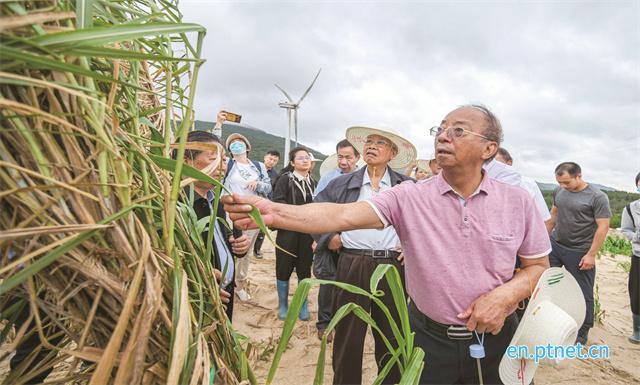Academicians and experts inspect “magic grass” in Pingtan
en.ptnet.cn | Updated:2022-06-28 | Lin Kongbo, Stephanie
Academicians and experts observe the growth of Juncao in Pingtan.
A delegation comprised of over 50 academicians, experts, and scholars from the Chinese Academy of Science, Chinese Academy of Engineering, and Fujian Agriculture and Forestry University inspected Juncao (a breed of grass cultivated by Chinese scientists) ‘s roles in improving the ecological environment of Pingtan, an island off E China’s Fujian province and the closest place on the mainland to the island of Taiwan on June 18.
Juncao, dubbed “magic grass,” is a breed of grass cultivated by Chinese scientists. The Juncao technique has been promoted in 106 countries. Local farmers' incomes have doubled, even tripled, after they grew mushrooms with Juncao.
“This is a swath of highly saline-alkali land, on which even Casuarina can’t survive. But Juncao can thrive here,” introduced Lin Zhanxi, a professor from Fujian Agriculture and Forestry University and chief scientist of the China National Engineering Research Center of Juncao Technology at Xingfuyang Intertidal Zone of Pingtan.
On the spot, the delegation investigated the experimental demonstration and specific model of Juncao’s key technology for improving saline-alkali land. The research team of Fujian Agriculture and Forestry University tested the production of some Juncao and the salinity of the soil at the site. "After four years of trials, the 'Oasis No. 1' Juncao we screened out can be grown in saline-alkali land with salinity below 9‰. Not only could it preserve water and soil and reduce soil salinity, but Juncao also serves as a good feed for livestock," Lin Zhanxi said.
Casuarina is a pillar of windbreak on Pingtan Island. “Juncao features greater salinity and alkali resistance than Casuarina. We hope to reduce the salinity of the soil gradually by growing Juncao. After reaching a certain level, it will be conducive to the survival of Casuarina to put up a better protective wall on the island,” Chen Gang, a senior engineer at Pingtan Natural Resources Service Center, said.
In the afternoon, the delegation also studied Juncao sand break along the coast. Changjiang’ao Bay is one of the windiest spots in Pingtan, making it challenging for plants to survive in this area. In 2018, strains tailored to counter quicksand were planted on a trial basis. Now they have created a pleasant ecological environment.
"Juncao grows fast and has a well-developed root system. It can rebuild vegetation in a short period of time and has an obvious effect of preventing wind and resisting soil loss," Lin noted.
The academicians and experts recognized Pingtan’s Juncao pilot project. “It’s a conundrum as well as a major task to fix the ecology. Pingtan made it by introducing Juncao. It’s worth popularizing,” said Zhu Yongguan, an academician of the Chinese Academy of Sciences and a professor at the Institute of Urban Environment of the Chinese Academy of Sciences.
Spotted a mistake or want to add something? All rights reserved. Do not reproduce our content without permission–you can contact us directly on our Facebook messenger or Twitter mailbox. Follow @pingtanchina (Facebook/Twitter)

 Fujian Public Security Registration Code: 35012802000271
Fujian Public Security Registration Code: 35012802000271